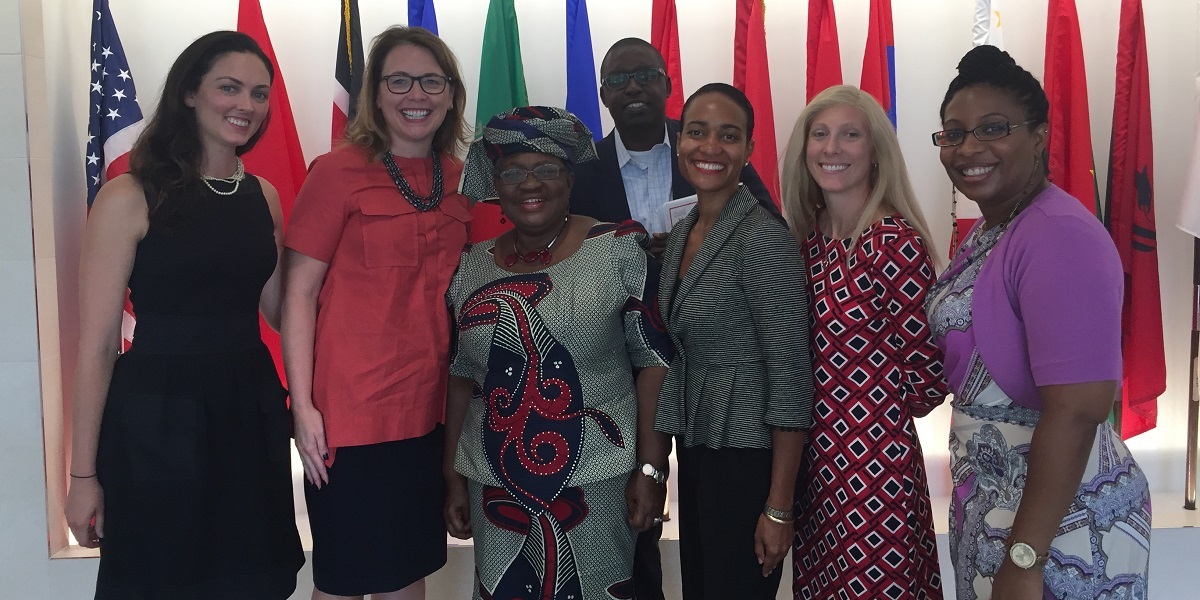Internationally recognized development economist Ngozi Okonjo-Iweala served as Nigeria’s Minister of Foreign Affairs and twice as Nigeria’s Finance Minister — the first woman to hold either post. She has held several key positions at the World Bank, and in 2014, Time magazine named her one of the 100 most influential people in the world. Currently, Okonjo-Iweala is the Board Chair of Gavi, the Vaccine Alliance, and Senior Advisor at the financial advisory and asset management firm Lazard.
During a recent visit to MCC, Okonjo-Iweala joined MCC CEO Dana J. Hyde for an engaging conversation about the challenges facing Africa, how to ensure inclusive economic growth, and what young women should keep in mind when choosing a workplace. Here are some of the highlights from their conversation.
Dr. Ngozi, through your extensive experience, what have you learned about creating economic growth in developing countries?
What I’ve learned is how difficult it is, and that there are no easy answers. Those who say they have the magic wand to make inclusive growth and development happen are really not telling it as it is.
The first and foremost thing for growth and inclusive development is a stable macroeconomic environment. If you don’t have stability in your basic prices in the economy, the exchange rate is not well-aligned; if inflation is high, which taxes the poor; if your fiscal deficit is out of control — and you have not fixed all those, all the money you are pouring into securing development isn’t going to work.
I also learned that inclusivity for poor people means that they want jobs — they are not looking for handouts. So inclusive growth means the ability to create jobs.
What is the role of infrastructure in inclusive development?
The creation of jobs in many of our countries cannot really happen the way we would like without adequate infrastructure. I say to young men and women, “Don’t wait for the government or a company to give you a job, create a job first for yourself and then for six or more people.” To do that, you need infrastructure. You can’t do it if you don’t have power — that’s the most important thing. And power is what’s most lacking in African countries. So we need power, we need roads, we need ports, we need connectivity and infrastructure for information and communications technology, and I want to commend MCC for expending its resources on these.

MCC
Internationally recognized development economist Ngozi Okonjo-Iweala (third from left) and MCC CEO Dana J. Hyde (second from left) pose with MCC staff following their conversation at the agency’s Washington, D.C., headquarters.
What do donors get right, and what do they get wrong?
It’s also what countries get right, and what they get wrong. No country can develop just with donor support. If a country cannot set out its policies, its priorities, its strategies, then there is a problem. Because what you need is for donors to come behind those and support you — that’s the best way to operate. It’s also the hardest. It’s easier to come in, craft something and implement, but MCC should stick with its country-led approach.
MCC has a very special niche because you are an organization that can do hard things like infrastructure. Grant money is powerful, and you have a portfolio of over $11 billion. I think MCC should use that leverage wisely for two things: one is to support countries, strongly insisting that they have a view, and they don’t just give into whatever you say; second is to leverage other donors and the private sector to put up more resources.
There is much commentary about the slowdown of economic growth in Africa. What makes you most hopeful about the continent?
There are two things that make me hopeful. First, it’s the young people — I get so excited when I meet them. Although they are frustrated with older generations for having messed things up in many ways, they are full of ideas and energy about what to do next. The second thing that gives me hope is that, for the most part, policymakers on the continent have learned that macroeconomic fundamentals like controlling inflation matter. This is the reason that Africa’s economic growth is a trend, not a fluke. The continent is experiencing a difficult period now, but if policymakers focus on good policies, there will be a turnaround.
You have been such an inspiration to young women around the world. What is your advice to young women?
When women get top posts, even in developed countries, people somehow think they have too much power. You will be judged more harshly, and people expect more of you as a woman. So it’s not easy, but does that mean that you should shy away from doing those tough things if the opportunity comes? The answer is no. But you have to be wise about it, you have to have principles.
I advise everybody, but women in particular, to try to work in places where they can quantify and measure what you are doing, so it doesn’t depend entirely on somebody’s judgement. The World Bank, where I started out in the Young Professionals Program, was good in that way. You were given a task and you produced it to quality, or you did not. Even if people did not like you — your gender, your color or whatever — if you did a good project, a good report, a good result on the ground, it spoke for itself.
Finally, there’s no easy answer to balancing work and family. You need to do what you are comfortable with. I think the best thing I have done in my whole life are my children. All my other titles pale in contrast when I think of my children.
*This is an abridged and lightly edited version of their conversation at MCC.

